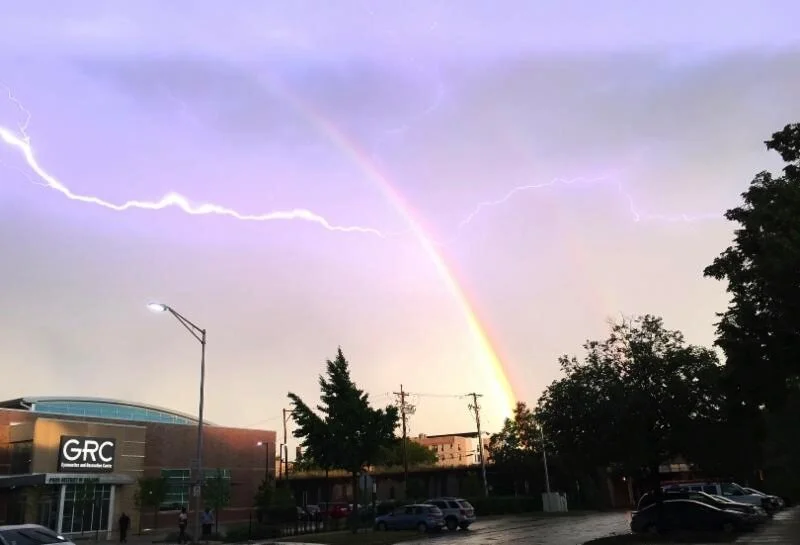It is Recognizing of the Right Thing
Lightening and Rainbow over Oak Park, IL, July 16, 2016 Photo by June TanoueʻHe ʻike ʻana ia i ka pono. It is recognizing of the right thing. One has seen the right thing to do and has done it. 'Olelo No'eau - Hawaiian Proverbs & Poetical Sayings #62 Collected, translated and annotated by Mary Kawena Pukui Halau i Ka Pono is the name I chose for my hula school. It centers around the word "pono." According to the Hawaiian dictionary pono means many things.... goodness, uprightness, morality, correct or proper procedure, excellence, well-being, true condition or nature. ʻIʻ means to or towards and ʻkaʻ means the. Literally i ka pono means towards the goodness. And pono or goodness for me means to be balanced, to be "right" with yourself and your moral compass. I remember my early training with Papa Henry Auwae in his laʻau lapaʻau (healing with plants and spirituality) classes. Pono was one of the main values he discussed in our first class in 1995. It makes sense that healers have to be pono - balanced in body, mind and spirit. Healers need to take care of and love themselves. Healers need to know what is the right thing to do in any situation and then do it. Pono includes clarity and wisdom. But is this value only limited to healers? How do we cultivate pono? We have to look deeper into the meaning of pono to be able to understand it. Pono means realizing your kuleana (responsibilities) which includes traditional and current protocols or procedures. Then we must follow these procedures with disciplined intention. Pono blossoms when we are mindful and aware of our actions and how they impact others. Pono is also about courage and the ability to hold your own and not turn away when the going gets tough. Pono is about profound respect for others. We are bound to make mistakes and when we do, we must be able to face them, make amends, and truly learn from our mistakes. For serious hula students who study with me I maintain five expectations - practices that help us to be Pono. When one is not pono, it is hard to be a good dancer. On the surface the expectations seem simple enough. Iʻll mention one here - Hoʻolohe is to Listen. That seems easy enough to do. But if we go deeper and ask, "Can you hear the kupuna (ancestors) whispering in your ear?" Thatʻs another story. I really believe that you donʻt have to be Hawaiian to hear the kupuna guiding you. But weʻll never get to that depth of listening with our minds full of judgments and anxieties about ourselves and others. Many of us fear failure and worry "What in the world will I feed my children tonight or how am I going to face my boss tomorrow?" The list and the noise grows. Our habitual thoughts are very strong. It takes a powerful antidote to overcome such entrenched thought patterns. Some people turn to drugs and alcohol or binge-watching Netflix hoping to take the edge off. But then there are other ways to relax - for instance communities like my Zen sangha. We just sit patiently and watch our thoughts come and then let them go. The more we sit, the more it disciplines our minds, increases patience, and enhances our ability to listen. Thatʻs called bearing witness or listening deeply to our thoughts without getting attached to them or feeling we have to "fix" anything. Listening has to do with physically stopping our bodies. When we do that we sometimes notice that our bodies have stopped but our minds still speeds along. And thatʻs a good thing - good that at least we noticed! Our minds can seem impossible to stop much less slow down. Thereʻs an idea that meditation is only about having a mind devoid of thoughts. But for everyday people like us itʻs not about stopping thinking altogether. Itʻs about sitting still, noticing our thoughts and returning to breath, over and over again. Returning to breath is becoming embodied and helps to "cool" the brain. Our thoughts begin to settle so we have room to think more deeply and clearly with less mental interference. This is how we can truly be of better service to our families and our communities. Little by little as we see more clearly courage builds to do what must be done: to stop procrastinating, to stop turning away from difficulty, and to live what you know is pono. Malama pono (take care of body, mind and heart), Sensei June Kaililani Tanoue Kumu Hula


